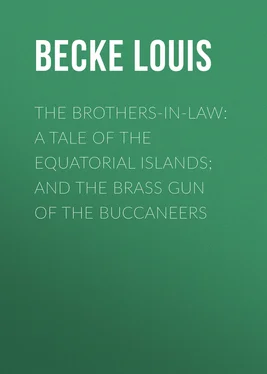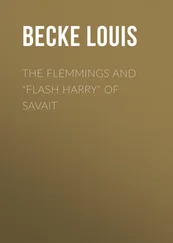Louis Becke - The Brothers-In-Law - A Tale Of The Equatorial Islands; and The Brass Gun Of The Buccaneers
Здесь есть возможность читать онлайн «Louis Becke - The Brothers-In-Law - A Tale Of The Equatorial Islands; and The Brass Gun Of The Buccaneers» — ознакомительный отрывок электронной книги совершенно бесплатно, а после прочтения отрывка купить полную версию. В некоторых случаях можно слушать аудио, скачать через торрент в формате fb2 и присутствует краткое содержание. Жанр: foreign_prose, literature_19, foreign_antique, на английском языке. Описание произведения, (предисловие) а так же отзывы посетителей доступны на портале библиотеки ЛибКат.
- Название:The Brothers-In-Law: A Tale Of The Equatorial Islands; and The Brass Gun Of The Buccaneers
- Автор:
- Жанр:
- Год:неизвестен
- ISBN:нет данных
- Рейтинг книги:3 / 5. Голосов: 1
-
Избранное:Добавить в избранное
- Отзывы:
-
Ваша оценка:
- 60
- 1
- 2
- 3
- 4
- 5
The Brothers-In-Law: A Tale Of The Equatorial Islands; and The Brass Gun Of The Buccaneers: краткое содержание, описание и аннотация
Предлагаем к чтению аннотацию, описание, краткое содержание или предисловие (зависит от того, что написал сам автор книги «The Brothers-In-Law: A Tale Of The Equatorial Islands; and The Brass Gun Of The Buccaneers»). Если вы не нашли необходимую информацию о книге — напишите в комментариях, мы постараемся отыскать её.
The Brothers-In-Law: A Tale Of The Equatorial Islands; and The Brass Gun Of The Buccaneers — читать онлайн ознакомительный отрывок
Ниже представлен текст книги, разбитый по страницам. Система сохранения места последней прочитанной страницы, позволяет с удобством читать онлайн бесплатно книгу «The Brothers-In-Law: A Tale Of The Equatorial Islands; and The Brass Gun Of The Buccaneers», без необходимости каждый раз заново искать на чём Вы остановились. Поставьте закладку, и сможете в любой момент перейти на страницу, на которой закончили чтение.
Интервал:
Закладка:
Louis Becke
The Brothers-In-Law: A Tale Of The Equatorial Islands; and The Brass Gun Of The Buccaneers / 1901
THE BROTHERS-IN-LAW: A TALE OF THE EQUATORIAL ISLANDS
“There,” said Tâvita the teacher, pointing with his paddle to a long, narrow peninsula which stretched out into the shallow waters of the lagoon, “there, that is the place where the battle was fought. In those days a village of thirty houses or more stood there; now no one liveth there, and only sometimes do the people come here to gather cocoanuts.”
The White Man nodded. “‘Tis a fair place to look upon. Let us land and rest awhile, for the sun is hot.”
The native pastor swung the bow of the canoe round towards the shore, and presently the little craft glided gently upon the hard, white sand, and the two men got out, walked up to the grove of cocoa-palms, and sat down under their shade to rest and smoke until the sun lost some of its fierce intensity and they could proceed on their journey homeward to the principal village.
The White Man was the one trader living in Peru, 1 1 Francis Island, or Peru, is one of the largest atolls of the Gilbert Group in the South Pacific, about one hundred and twenty miles south of the Equator
the native was a Samoan, and one of the oldest and bravest missionaries in the Pacific. For twenty years he had dwelt among the wild, intractable, and savage people of Peru—twenty years of almost daily peril, for in those days the warlike people of the Gilbert Group resented the coming of the few native teachers scattered throughout the archipelago, and only Tavita’s undaunted courage and genial disposition had preserved the lives of himself and his family. Such influence as he now possessed was due, not to his persistent attempts to preach Christianity, but to his reputation for integrity of conduct and his skill as a fisherman and carpenter.
The White Man and he were firm friends, and that day they had been down to the north end of the lagoon to collect a canoe load of the eggs of a small species of tern which frequented the uninhabited portion of the island in myriad swarms.
Presently, as they sat and smoked, and lazily watched a swarm of the silvery mullet called kanae disporting themselves on the glassy surface of the lagoon, the White Man said—
“Who were these white men, Tâvita, who fought in the battle?”
“Hast never heard the story?” inquired the teacher in Samoan.
The trader shook his head. “Only some of it—a little from one, a little from another.”
“Then listen,” said Tâvita, re-filling his pipe and leaning his broad back against the bole of a cocoa-palm.
“It was nineteen years ago, and I had been living on the island but a year. In those days there were many white men in these islands. Some were traders, some were but papalagi tafea 2 2 Beachcombers.
who spent their days in idleness, drunkenness, and debauchery, casting aside all pride and living like these savage people, with but a girdle of grass around their naked waists, their hands ever imbued in the blood of their fellow white men or that of the men of the land.
“Here, on this island, were two traders and many beachcombers. One of the traders was a man named Carter, the other was named West Carter the people called ‘Karta,’ the other by his fore name, which was ‘Simi’ (Jim). They came here together in a whaleship from the Bonin Islands with their wives—two sisters, who were Portuguese half-castes, and both very beautiful women. Carter’s wife had no children; West, who was the younger man, and who had married the younger sister, had two. Both brought many thousands of dollars worth of trade with them to buy cocoanut oil, for in those days these natives here did not make copra as they do now—they made oil from the nuts.
“Karta built a house on the north end of the island, where there is the best anchorage for ships, West chose to remain on the lee side where he had landed, and bought a house near to mine. In quite a few days we became friends, and almost every night we would meet and talk, and his children and mine played together. He was quite a young man, and had been, he told me, the third mate of an English ship which was cast away on the Bonin Islands four years before, where he had met Karta, who was a trader there, and whose wife’s sister he married.
“One day they heard from the captain of a whaleship that there was much money to be made on this island of Peru, for although there were many beachcombers living here there was no trader to whom the people could sell their oil. So that was why they came here.
“Now, although these two men were married to two sisters, there was but little love between them, and then as time went on came distrust, and then hatred, born out of Karta’s jealousy and wicked heart; but until they came to live here on Peru there had been no bad blood—not even enough to cause a bitter word, though even then the younger man did not like Karta, who was a man of violent temper, unfaithful to his wife, and rude and insulting in his manner to most men, white or brown. And Serena, his wife, hated him, but made no sign.
“As time went on, both men prospered, for there was much oil to be had, and at the end of the first year a schooner came from Sydney and bought it I went on board with Simi, after the oil had been rafted off to the ship’s side. Karta, too, came on board to be paid for his oil. He had been drinking much grog and his face was flushed and angry. With him were three beachcombers whose foul language and insolent demeanour angered both the captain and Simi, who were quiet men. There were six or seven of these beachcombers living on the island, and they all disliked Simi, who would have none of their company; but in Karta’s house they were made welcome. Night after night they would gather there and drink and gamble, for some of them had bags of dollars, for dissolute and idle as they were for the most of their time they could make money easily by acting as interpreters for the natives, to the captains of the whaleships, or as pilots to the trading vessels sailing northward to the Marshall Islands.
“The captain paid Simi partly in money and partly in trade goods, for the two hundred casks of oil he bought, and then Simi and I turned to go on shore. Karta had scarce spoken ten words to Simi, who yet bore him no ill-will, although for many months tales had come to us of the evil life he led and the insults he put upon his wife Serena.
“But after he had bidden farewell to the captain, Simi held out his hand to his brother-in-law and said—‘My wife Luisa sendeth love and greetings to Serena. Is she in good health?’
“Karta would not take the hand held out to him.
“‘What is that to thee or thy wife either?’ he answered rudely. ‘Look to thy own business and meddle not with mine.’
“Simi’s face grew red with anger, but he spoke quietly and reproved his brother-in-law for his rude speech. ‘Why insult me needlessly before so many strangers?’ he said. ‘What harm have I or my wife Luisa ever done to thee?’
“‘Curse thee and Luisa, thy wife,’ said Karta again; ‘she and thee, aye, and Serena too, are well matched, for ye be all cunning sneaks and fit company for that fat-faced Samoan psalm-singer who stands beside thee.’
“At these words the three beachcombers laughed, and when they saw that Simi made no answer, but turned aside from Karta in contempt, one of them called him a coward.
“He turned upon him quickly. ‘Thou liest, thou drunken, useless cumberer of the earth,’ he said, looking at him scornfully; ‘no coward am I, nor a noisy boaster like thee. This is no place for us to quarrel. But say such a thing to me on the beach if ye dare.’
Читать дальшеИнтервал:
Закладка:
Похожие книги на «The Brothers-In-Law: A Tale Of The Equatorial Islands; and The Brass Gun Of The Buccaneers»
Представляем Вашему вниманию похожие книги на «The Brothers-In-Law: A Tale Of The Equatorial Islands; and The Brass Gun Of The Buccaneers» списком для выбора. Мы отобрали схожую по названию и смыслу литературу в надежде предоставить читателям больше вариантов отыскать новые, интересные, ещё непрочитанные произведения.
Обсуждение, отзывы о книге «The Brothers-In-Law: A Tale Of The Equatorial Islands; and The Brass Gun Of The Buccaneers» и просто собственные мнения читателей. Оставьте ваши комментарии, напишите, что Вы думаете о произведении, его смысле или главных героях. Укажите что конкретно понравилось, а что нет, и почему Вы так считаете.












